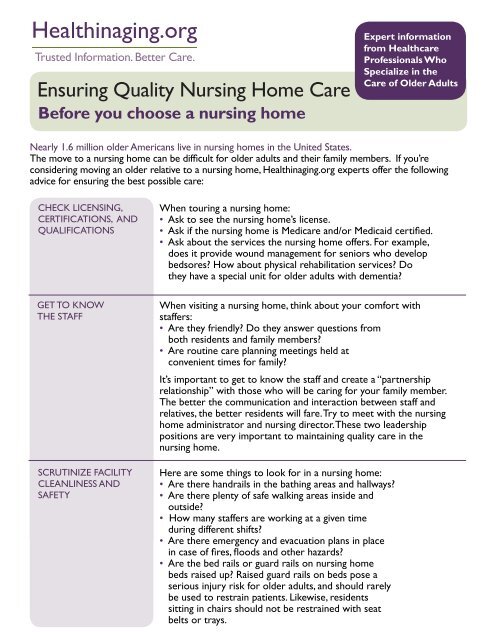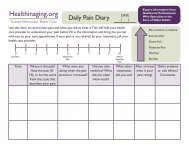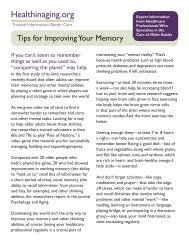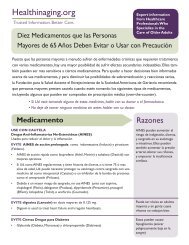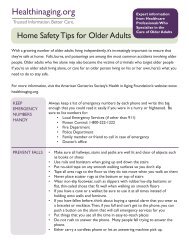Finding Quality Nursing Home Care - Health in Aging
Finding Quality Nursing Home Care - Health in Aging
Finding Quality Nursing Home Care - Health in Aging
You also want an ePaper? Increase the reach of your titles
YUMPU automatically turns print PDFs into web optimized ePapers that Google loves.
Ensur<strong>in</strong>g <strong>Quality</strong> <strong>Nurs<strong>in</strong>g</strong> <strong>Home</strong> <strong>Care</strong><br />
Before you choose a nurs<strong>in</strong>g home<br />
Expert <strong>in</strong>formation<br />
from <strong>Health</strong>care<br />
Professionals Who<br />
Specialize <strong>in</strong> the<br />
<strong>Care</strong> of Older Adults<br />
Nearly 1.6 million older Americans live <strong>in</strong> nurs<strong>in</strong>g homes <strong>in</strong> the United States.<br />
The move to a nurs<strong>in</strong>g home can be difficult for older adults and their family members. If you’re<br />
consider<strong>in</strong>g mov<strong>in</strong>g an older relative to a nurs<strong>in</strong>g home, <strong>Health</strong><strong>in</strong>ag<strong>in</strong>g.org experts offer the follow<strong>in</strong>g<br />
advice for ensur<strong>in</strong>g the best possible care:<br />
CHECK LICENSING,<br />
CERTIFICATIONS, AND<br />
QUALIFICATIONS<br />
Get to know<br />
the staff<br />
Scrut<strong>in</strong>ize facility<br />
cleanl<strong>in</strong>ess and<br />
safety<br />
When tour<strong>in</strong>g a nurs<strong>in</strong>g home:<br />
• Ask to see the nurs<strong>in</strong>g home’s license.<br />
• Ask if the nurs<strong>in</strong>g home is Medicare and/or Medicaid certified.<br />
• Ask about the services the nurs<strong>in</strong>g home offers. For example,<br />
does it provide wound management for seniors who develop<br />
bedsores? How about physical rehabilitation services? Do<br />
they have a special unit for older adults with dementia?<br />
When visit<strong>in</strong>g a nurs<strong>in</strong>g home, th<strong>in</strong>k about your comfort with<br />
staffers:<br />
• Are they friendly? Do they answer questions from<br />
both residents and family members?<br />
• Are rout<strong>in</strong>e care plann<strong>in</strong>g meet<strong>in</strong>gs held at<br />
convenient times for family?<br />
It’s important to get to know the staff and create a “partnership<br />
relationship” with those who will be car<strong>in</strong>g for your family member.<br />
The better the communication and <strong>in</strong>teraction between staff and<br />
relatives, the better residents will fare. Try to meet with the nurs<strong>in</strong>g<br />
home adm<strong>in</strong>istrator and nurs<strong>in</strong>g director. These two leadership<br />
positions are very important to ma<strong>in</strong>ta<strong>in</strong><strong>in</strong>g quality care <strong>in</strong> the<br />
nurs<strong>in</strong>g home.<br />
Here are some th<strong>in</strong>gs to look for <strong>in</strong> a nurs<strong>in</strong>g home:<br />
• Are there handrails <strong>in</strong> the bath<strong>in</strong>g areas and hallways?<br />
• Are there plenty of safe walk<strong>in</strong>g areas <strong>in</strong>side and<br />
outside?<br />
• How many staffers are work<strong>in</strong>g at a given time<br />
dur<strong>in</strong>g different shifts?<br />
• Are there emergency and evacuation plans <strong>in</strong> place<br />
<strong>in</strong> case of fires, floods and other hazards?<br />
• Are the bed rails or guard rails on nurs<strong>in</strong>g home<br />
beds raised up? Raised guard rails on beds pose a<br />
serious <strong>in</strong>jury risk for older adults, and should rarely<br />
be used to restra<strong>in</strong> patients. Likewise, residents<br />
sitt<strong>in</strong>g <strong>in</strong> chairs should not be restra<strong>in</strong>ed with seat<br />
belts or trays.
MAKE SURE RESIDENTS<br />
WITH SPECIAL<br />
NUTRITIONAL NEEDS<br />
ARE WELL NOURISHED<br />
F<strong>in</strong>d out how staff help residents who have special dietary needs, or<br />
are unable to feed themselves. Some questions you can ask are:<br />
• Does the staff try to feed seniors out of bed? What strategies<br />
do they use to do so?<br />
• Does the nurs<strong>in</strong>g home accommodate special dietary needs?<br />
For example, do they prepare pureed foods, and carefully<br />
monitor meals for residents with diabetes and food allergies?<br />
• Take a look at the d<strong>in</strong><strong>in</strong>g room. How is the food served; on<br />
trays or from steam tables?<br />
EVALUATE ROUTINES<br />
AND ACTIVITIES<br />
Residents <strong>in</strong> nurs<strong>in</strong>g homes who don’t have dementia or other<br />
cognitive problems should be able to make choices about their daily<br />
rout<strong>in</strong>es. For example, they can decide when to go to bed, and<br />
when to bathe.<br />
In special care units for residents with dementia, however, it should<br />
be clear that the nurs<strong>in</strong>g home follows a consistent rout<strong>in</strong>e. This is<br />
especially important for residents with dementia.<br />
You should also consider the range of activities offered. Activities<br />
help nurs<strong>in</strong>g home residents rema<strong>in</strong> social and stimulated. These<br />
may <strong>in</strong>clude:<br />
• arts and craft classes<br />
• chair exercise programs<br />
• religious services<br />
• discussion groups<br />
• enterta<strong>in</strong>ment (for example, such as musical and dance<br />
performances or movie nights)<br />
Ask the nurs<strong>in</strong>g home if they can provide other activities if your<br />
family member has difficulty participat<strong>in</strong>g <strong>in</strong> the exist<strong>in</strong>g options.<br />
40 Fulton Street, 18th Floor<br />
New York, New York 10038<br />
212.308.1414 TEL<br />
212.832.8646 FAX<br />
StaffHIA@americangeriatrics.org<br />
DISCLAIMER: This <strong>in</strong>formation is not <strong>in</strong>tended to diagnose health problems or<br />
to take the place of medical advice or care you receive from your physician or<br />
other healthcare provider. Always consult your healthcare provider about your<br />
medications, symptoms, and health problems. May 2013
Ensur<strong>in</strong>g <strong>Quality</strong> <strong>Nurs<strong>in</strong>g</strong> <strong>Home</strong> <strong>Care</strong><br />
Expert <strong>in</strong>formation<br />
from <strong>Health</strong>care<br />
Professionals Who<br />
Specialize <strong>in</strong> the<br />
<strong>Care</strong> of Older Adults<br />
After you’ve placed your family member <strong>in</strong> a facility<br />
KEEP VISITING!<br />
See<strong>in</strong>g family is very important for your family member’s well-be<strong>in</strong>g.<br />
So make frequent social visits. Your visits will help your family member<br />
feel happier and comforted by your presence. He or she will also feel<br />
more settled <strong>in</strong> his or her new home.<br />
If you make regular visits you’re also more likely to notice signs of new<br />
health problems or <strong>in</strong>juries or other changes <strong>in</strong> your family member<br />
that may be overlooked by staff. You are also more likely to notice<br />
changes <strong>in</strong> the nurs<strong>in</strong>g home staff that could affect quality of care.<br />
BE ON THE LOOKOUT<br />
FOR SIGNS OF NEGLECT<br />
OR ABUSE<br />
If you see an older adult—your family member or any other resident—<br />
who is wear<strong>in</strong>g dirty cloth<strong>in</strong>g, looks malnourished, or appears to have<br />
untreated health problems, you can take the follow<strong>in</strong>g steps:<br />
• First, speak to the charge nurse, the nurs<strong>in</strong>g supervisor, or even the<br />
director of nurs<strong>in</strong>g.<br />
• If you are still unhappy with how the matter was handled, you can<br />
contact an ombudsman (someone who is <strong>in</strong> charge of look<strong>in</strong>g <strong>in</strong>to<br />
possible violation of rights or poor adm<strong>in</strong>istration).<br />
• In extreme cases, you can also call the Department of <strong>Health</strong>.<br />
VISIT THE NURSING<br />
STATION OFTEN<br />
<strong>Nurs<strong>in</strong>g</strong> homes are required to post <strong>in</strong>formation on how you can<br />
report compla<strong>in</strong>ts. You should be able to f<strong>in</strong>d numbers to call from the<br />
nurs<strong>in</strong>g home.<br />
In addition, pressure or “bed sores” can be evidence of possible<br />
neglect. Bed sores is a pa<strong>in</strong>ful breakdown of the sk<strong>in</strong> that results <strong>in</strong><br />
mild redness and swell<strong>in</strong>g or, <strong>in</strong> extreme cases, <strong>in</strong> deep wounds and<br />
<strong>in</strong>fection. Bruises may be signs of abuse.<br />
You should stop at the nurs<strong>in</strong>g station each time you visit. You can<br />
monitor your loved one’s daily activities and ask about any changes <strong>in</strong><br />
medications, diet, behavior, sleep or exercise.<br />
You or another family member should be contacted immediately<br />
if a problem occurs –if your loved one falls, for example, or beg<strong>in</strong>s<br />
wander<strong>in</strong>g.<br />
As a caregiver, you have the right to be <strong>in</strong>formed.<br />
For additional <strong>in</strong>formation and to compare nurs<strong>in</strong>g homes <strong>in</strong> your area, go to Medicare’s<br />
<strong>Nurs<strong>in</strong>g</strong> <strong>Home</strong> Compare website at www.medicare.gov/nurs<strong>in</strong>ghomecompare/.<br />
40 Fulton Street, 18th Floor<br />
New York, New York 10038<br />
212.308.1414 TEL<br />
212.832.8646 FAX<br />
StaffHIA@americangeriatrics.org<br />
DISCLAIMER: This <strong>in</strong>formation is not <strong>in</strong>tended to diagnose health problems or<br />
to take the place of medical advice or care you receive from your physician or<br />
other healthcare provider. Always consult your healthcare provider about your<br />
medications, symptoms, and health problems. May 2013


